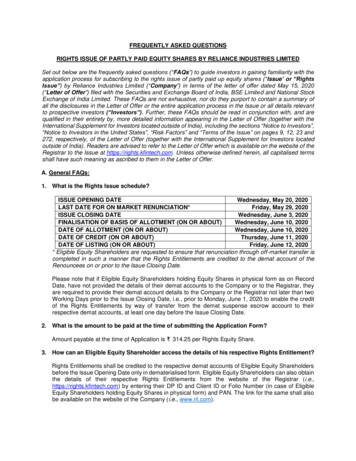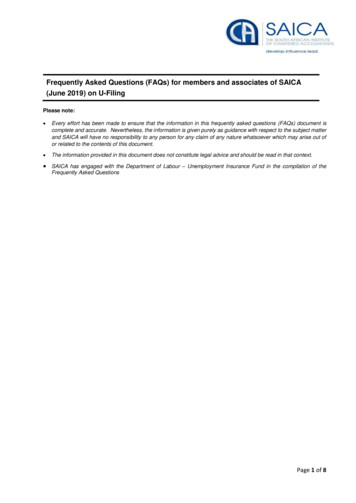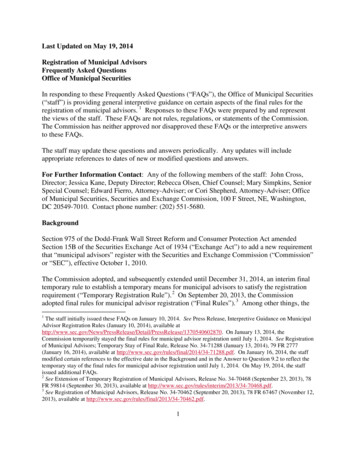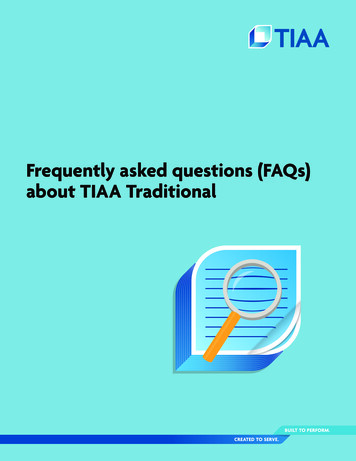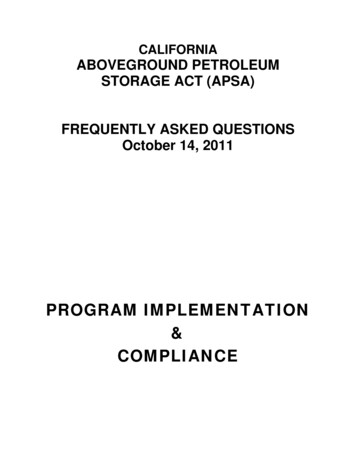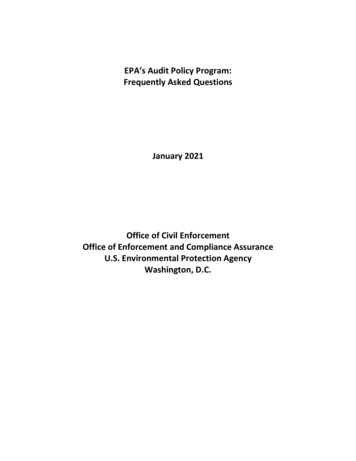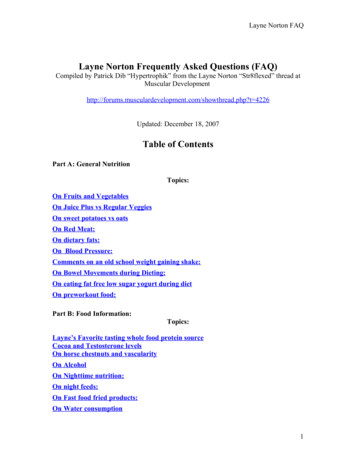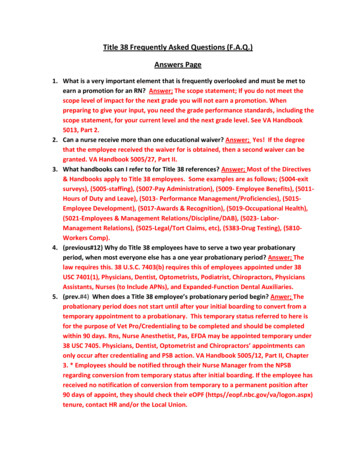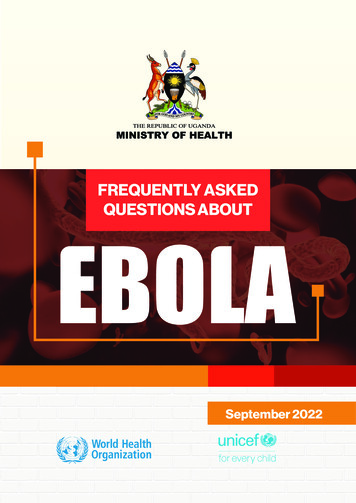
Transcription
FREQUENTLY ASKEDQUESTIONS ABOUTSeptember 2022
MINISTRY OF HEALTH1.What is Ebola?Ebola is a killer disease caused by a virus. Ebola virus is spreadby contact with bats and monkeys and also by contact with aperson infected by the Ebola virus. Ebola spreads quickly fromperson to person, kills in a short time BUT can be prevented.With early medical treatment the death rate can be significantlyreduced.2.Is an infected person contagious even if symptoms havenot appeared?A person infected with Ebola is not contagious before thesymptoms appear. The incubation period is 2 to 21 days.3. What are the signs and symptoms of Ebola?A person suffering from Ebola presents the following signs andsymptoms: High fever (brutal and prolonged) Abdominal pain Joint or body pain (especially the chest) Difficulty in swallowing Headache(s) Nausea, vomiting (can be bloody) Diarrhea (can be bloody) Dehydration (no tears, dry tongue, sunken eyes). Rash In some cases bleeding from the mouth, eyes, nose, ears andanus. It is important to note that a person is contagious onlywhen they begin to have one or more signs of the disease.Q&A About Ebola1
MINISTRY OF HEALTHSigns and symptoms of EbolaSudden onsetof feverHeadacheMuscle painIntense bodyweaknessSore throatVomitingBloody diarrhoeaor urine2Bleeding from bodyopeningsQ&A About Ebola
MINISTRY OF HEALTH4.Can a person with Ebola survive?Yes. The chances of survival increase significantly if an infectedperson seeks medical treatment early.5.If a person infected by Ebola survives, is she/hecontagious?No, before returning home, Ebola patients WILL have their bloodtested in the laboratory to ensure that the virus is no longer intheir body. However, people who have recovered from the illnessshould NOT have sex for at least three months unless they usecondoms.6.Can Ebola be transmitted by saliva?Yes. The Ebola Virus can be transmitted by saliva and other bodilyfluids such as stool, urine, semen, vaginal secretions, runny nose,as well as blood. When these fluids get in contact with brokenskin, the eyes or the mouth of other people, they can get theEbola virus.7.Can Ebola be transmitted by sweat?Yes. Any body fluids of an infected person including sweat havethe Ebola virus.8.Can Ebola be transmitted by shaking hands?Yes, shaking hands with a person infected with Ebola transmitsthe disease.9.How should I greet people, if the hand shake is notrecommended?Hand shaking should be avoided as it is a risk during an Ebolaoutbreak or before a potential outbreak. You can greet peopleby waving to them or acknowledge by shaking your head. It isvery important to wash your hands with soap and clean waterregularly.10.What distance do I need to keep away from peoplesuspected of having Ebola?Specific distance does not matter. Ebola is transmitted by contactwith body fluids from an infected person. However, if you knowQ&A About Ebola3
MINISTRY OF HEALTHany person suspected of Ebola, please report to the nearesthealth facility as soon as possible and listen to the advice fromthe health workers. Avoid touching and handling objects thathave been used by a person suspected of having Ebola.Transmission of ent use by aninfected personSweatSoiled clothing ofan infected personHandling wildlifewhether alive or dead4Q&A About Ebola
MINISTRY OF HEALTHEBOLA AND ANIMAL TRANSMISSION11. Why should I not eat bush-meat?Do not eat bush-meat during an Ebola outbreak. Wild animals arethe source of the Ebola virus. Monkeys, chimpanzees, bats and alldead animals found in the bush must NOT be touched or eaten.12. If bush-meat is well cooked or smoked, is it safe to eat?No, because during hunting, slaughtering and preparing bushmeat people are exposed to the Ebola Virus. That is howtransmission occurs and the reason why people should avoidtouching or eating bush-meat.13.Do I need to avoid all bush-meat or just monkey and batmeat?During an Ebola outbreak, avoid all bush-meat because it is verydangerous and can infect you with Ebola.14. Can Ebola be in chickens, goats or cows?No. There is no evidence linking Ebola and domestic animalssuch as chickens, goats and cows. It is only bush-meat that isdangerous.15. Should I stop eating fish too?No, fish is very safe. There is no evidence linking Ebola and Fish16.Can I get Ebola through contact with urine and droppingsof bats?Yes, bats are carriers of the Ebola Virus. You can get Ebola if youare in contact with urine and/or droppings of infected bats. Avoidcontact with bats and their body fluids including droppings beforeand during an Ebola outbreak.17.During the rainy season, there are many bats and theyfeed on mangoes. Do I stop eating mangoes?No, you can continue eating mangoes but wash them beforeeating. Do NOT eat mangoes that have been bitten by bats.Q&A About Ebola5
MINISTRY OF HEALTHTREATMENT OF EBOLA19. What do I do if I think I have Ebola?You must go immediately to the nearest health facility forassessment and treatment.20. Where can I buy medicine to treat Ebola?There is no specific medicine for Ebola. Go to the nearest healthfacility for treatment early if you think you have Ebola. Yourchances of survival and recovery are much higher if you seekearly treatment and care from qualified health workers. You willreceive supportive care and treatment of specific symptoms toimprove survival.21.I have heard that people are injected and killed at thehealth facility. Is this true?This is a false rumour. Although people do die of Ebola somepatients do recover. Chances of survival are greater when onestarts treatment early. All Ebola patients receive the best medicalcare and treatment possible. The medical team is working hard tosave their patients and to have them returned to their families. Atthe health facility the medical team treats Ebola by: Lowering the feverReducing the PainProviding good nutritionRehydrationInfection control And any other supportive treatment the patient may require.BELIEFS:22.Is it true that a mix of ginger, honey, garlic, onion andvinegar can cure Ebola?No, it is not true. There is no home remedy to treat Ebola. Youmust go to the nearest health facility for proper management andtreatment if you or someone you suspect has an Ebola infection.6Q&A About Ebola
MINISTRY OF HEALTHYour chances for survival are far much higher at an Ebola treatmentunit than at home.23.We have heard that drinking alcohol prevents Ebola virustransmission. Is this true?No, it is not true. Alcohol does not prevent you from gettingEbola infection when exposed to the virus. In fact, excessiveconsumption of alcohol is harmful to your body.24. Is it true that Ebola is a curse?No, it is not true. Ebola is a viral disease transmitted to humansfrom infected wild animals. It can also be spread from an infectedperson to another person.REPORTING25.Can I call a hotline or send an SMS to report suspectedcases of Ebola?Yes, EVD Alert lines0762 640 374 (MTN) / 0708 062 203 (AIRTEL)26. How effective is the surveillance system in Uganda?There is an effective surveillance system in place that can identifyany suspected Ebola case occurring anywhere in the country.The country also has the capacity to test for Ebola virus at theUganda Virus Research Institute in Entebbe.27. Can I care for a suspected person with Ebola at home?No, you are endangering the lives of your loved ones, your ownlife and those of the community, because the disease can easilyspread from one person to another. Persons infected with Ebolamust be treated and cared for at the health facility/hospitalQ&A About Ebola7
MINISTRY OF HEALTHGOVERNMENT RESPONSE28.What system has the Government put in place to screenpeople entering Uganda?The Ministry of Health is working on distributing assessmentquestionnaires to all travellers entering Uganda. Health Officersat the official Points of Entry in Uganda have been trained onEbola and are able to identify any suspicious cases on arrival anddeparture.29.What plans does the Government have to sendinformation about Ebola to the rural population?The Government is conducting sensitization meetings withreligious leaders, school authorities and community basedorganizations. Thus, information will be provided to the ruralpopulation from numerous sources. Communication materialssuch as posters and fact sheets have also been developed andare being disseminated to the affected high risk districts. TV,Radio and SMS is also being used to reach rural communities.30.Does the Government plan to close the borders with itsneighbours?No. Currently, there is no plan for closing the borders or posetravel restrictions to the affected districts. However, people arecalled upon to remain vigilant by practicing the set preventionbehaviours and also to report to the nearest health facility anypersons they suspect to have signs and symptoms of Ebola.8Q&A About Ebola
For more information on how toprevent Ebola Virus Disease, contact:Health Promotion, Education and CommunicationDepartment, Ministry of HealthReport all suspected cases to the nearest health facilityimmediately. OR send a FREE SMS to Ureport on: 8500 orcall toll free on: 0800 100066 / 0800 203 033Produced by the Department of Health Promotion, Educationand Communication, Ministry of Health
their body. However, people who have recovered from the illness should NOT have sex for at least three months unless they use condoms. 6. Can Ebola be transmitted by saliva? Yes. The Ebola Virus can be transmitted by saliva and other bodily fluids such as stool, urine, semen, vaginal secretions, runny nose, as well as blood.
